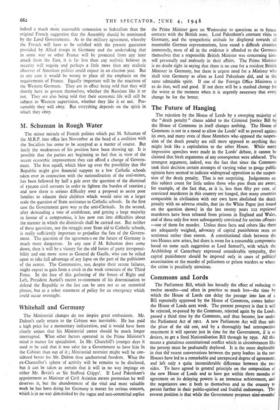The Future of Hanging
The rejection by the House of Lords by a sweeping majority of the "death penalty" clause added to the Criminal Justice Bill by the House of Commons in itself changes nothing. The House of Commons is not in a mood to allow the Lords' will to prevail against its own, and many even of those Members who opposed the suspen- sion of the death penalty are still more opposed to anything that might look like a capitulation to the other House. While many impressive speeches were made in the Lords' debate, it cannot be claimed that fresh arguments of any consequence were adduced. The strongest argument, indeed, was the fact that since the Commons took their decision certain attempts of varying value to gauge public opinion have seemed to indicate widespread opposition to the suspen- sion of the death penalty. That is not surprising. Judgements on this subject count for little unless those who pass them are aware, for example, of the fact that, as it is, less than fifty per cent, of convicted murderers in this country are hanged, that many countries comparable in civilisation with our own have abolished the death penalty with no adverse results, that (as the White Paper just issued on the question shows) in the last twenty years 112 reprieved murderers have been released from prisons in England and Wales, and of these only five were subsequently convicted for serious offences —one of them for murder. Unless these facts and others like them are adequately weighed, advocacy of capital punishment rests on sentiment rather than reason. A constitutional clash between the two Houses now arises, but there is room for a reasonable compromise based on some such suggestion as Lord Samuel's, with which the Archbishop of Canterbury expressed considerable sympathy, that capital punishment should be imposed only in cases of political assassination or the murder of policemen or prison warders or where the crime is peculiarly atrocious.


































 Previous page
Previous page